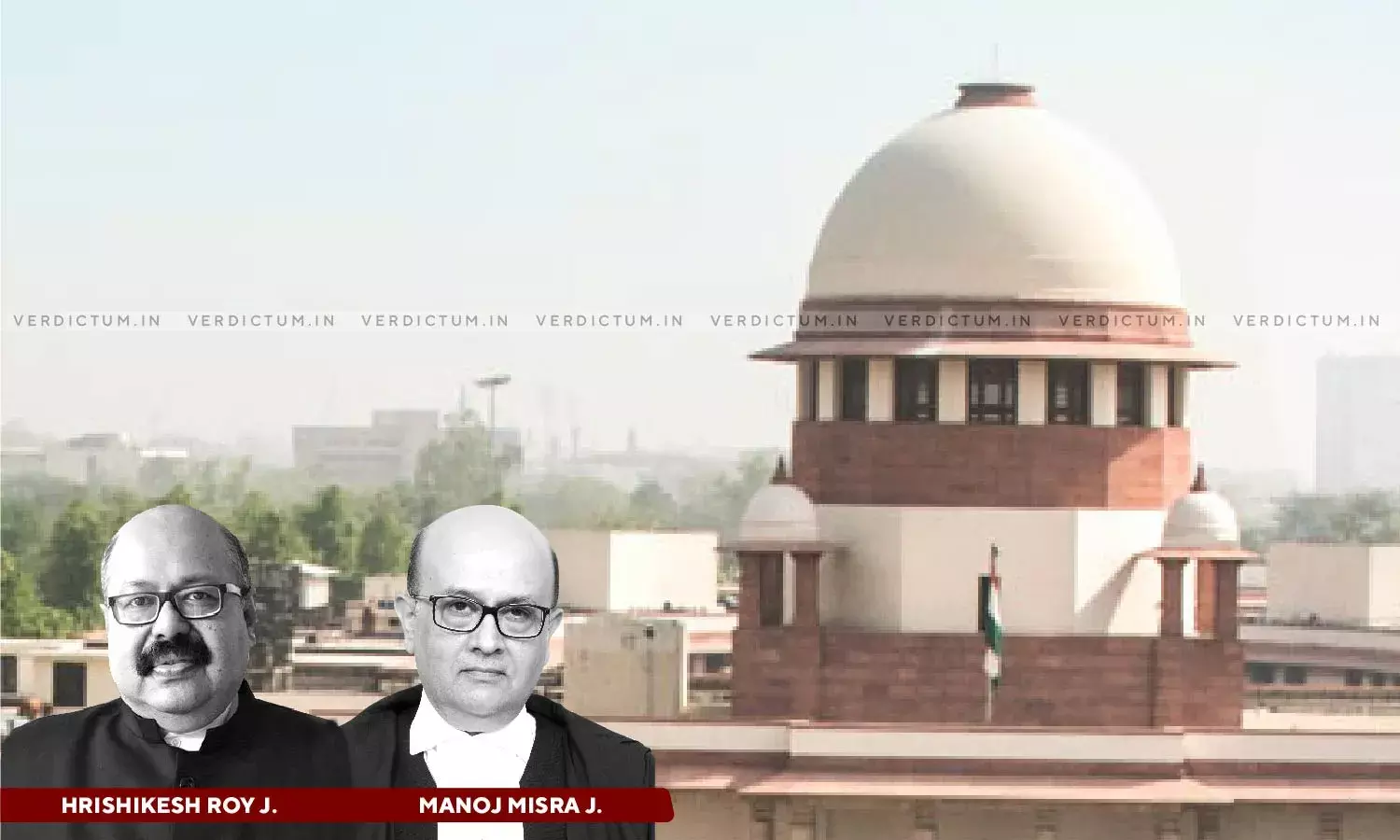Determining Jurisdiction Of Civil Court In Cases Challenging Acquisition When Party Fails To Serve Notice: SC Refers Matter To Larger Bench

A Supreme Court Bench of Justice Hrishikesh Roy and Justice Manoj Misra have referred a matter pertaining to the failure to serve notice under Section 52(2) of the Land Acquisition Act, 1959, maintainability, and the jurisdiction of the Civil Court to hear the case.
Senior Counsel Aruneshwar Gupta, assisted by AOR Sri Rajeev Singh appeared for the defendant-appellant, and Senior Counsel Manoj Swaroop appeared for the respondents.
In this case, the defendant had filed an appeal against the High Court's decision to dismiss their second appeal, which sought to overturn the judgment and decree of the first appellate Court. The first appellate Court had not only set aside the Trial Court's decree but also ruled in favor of the first respondent, granting them the full relief sought in the suit.
The original suit was initiated by Gordhan Dass in 1997 against the Urban Improvement Trust, Bikaner, Narayan Das (Respondent no.2), Kanhaiya Lal (Respondent no.3), and Ganesh Ram (Respondent no. 4). The plaintiff sought a permanent prohibitory injunction to prevent the Trust from acquiring a disputed piece of land without adhering to due legal procedures.
The plaintiff's case was based on the joint purchase of the land in dispute in 1970 through separate sale deeds. They claimed that a portion of the land had been converted for non-agricultural use with the District Collector's approval in 1971. The plaintiff argued that the Trust had falsely claimed ownership of the land and had initiated an unlawful acquisition.
The defendant, the Trust, contested the plaintiff's claims, asserting that they had legally acquired the land and that the plaintiff's suit was not maintainable. During the proceedings, amendments were made to the pleadings, and the plaintiff sought a mandatory injunction to regain possession of the land.
The Trial Court partially ruled in favor of the plaintiff, granting them possession of one bigha of the land, but not the remaining two bighas. The first appellate court, however, granted the plaintiff's suit in its entirety, and the defendant subsequently appealed to the High Court.
The High Court upheld the first appellate court's decision, reasoning that the acquisition was flawed due to a lack of notice to the plaintiff and that the suit was maintainable. The defendant then appealed to the Supreme Court, disputing the jurisdiction of the civil court to hear the case and the validity of the acquisition.
Justice Manoj Misra's Judgment
It was observed that the land in the case, the acquisition was for a public purpose, namely, development of land for residential colony, and by virtue of Section 52(4) of the Land Acquisition Act 1959, the land stood vested in the State free from all encumbrances with effect from the date of publication of the notification.
In light of the same, while relying on a catena of judgments including State of Bihar v. Dhirendra Kumar, it was said that, "in respect of land covered by the acquisition notification, the suit as framed was not maintainable."
Condemning the practice of "clever drafting", in that context, it was said that, "the suit in question is a classic example of clever drafting where to avoid crucial issues, such as the bar of limitation and response from the State, firstly, no declaration in respect of the acquisition notification was sought and, secondly, the State, which issued the acquisition notification and in whom the title of the land vested by a deeming fiction, was not impleaded as a party. Such clever drafting to avoid critical issues have been deprecated time and again by this Court as it amounts to an unfair practice."
It was stressed that when the relief of injunction was dependent on validity of the acquisition notification, the State was a necessary party as it alone could have appropriately produced all the records about the steps taken for acquisition of the land.
The suit was found to be not maintainable, and the appeal was allowed.
Justice Hrishikesh Roy's Judgment
It was observed that the mandatory requirements under the provisions of the 1959 Act were not followed before issuing notification, without which the title cannot be said to be disputed. In light of the same, it was said that, "Such a suit for injunction in the absence of contest to the title would therefore, be maintainable."
Subsequently, it was said that, "This was a situation of a genuine grievance attempted to be canvassed by the landowners before a Court of law. For a litigant who has partially succeeded from the 1st Court and later at the appellate stage obtained full relief from two courts be told that his suit is not maintainable? In my opinion, justice would be better served if the respondents are not forced to commence another round of litigation before the High Court to secure a redressal for their grievances pertaining to being deprived of their land without getting any notice or just compensation."
Upholding the decision of the High Court, the departure from the due process by the authorities was noted and the appeal was dismissed.
Order Passed:
In view of the difference of opinions and the distinguishing judgments, the Registry was directed to place the matter before the Chief Justice of India for referring the matter to a larger Bench.
Cause Title: Urban Improvement Trust, Bikaner vs Gordhan Dass (D) Through LRs & Ors.

